Pastors & Politics

Big day for church starts
Three congregations launched September 18




 BY MORGAN JACKSON
BY MORGAN JACKSON
When three new churches held their inaugural worship services September 18, it was an answer to prayer, said IBSA’s Van Kicklighter
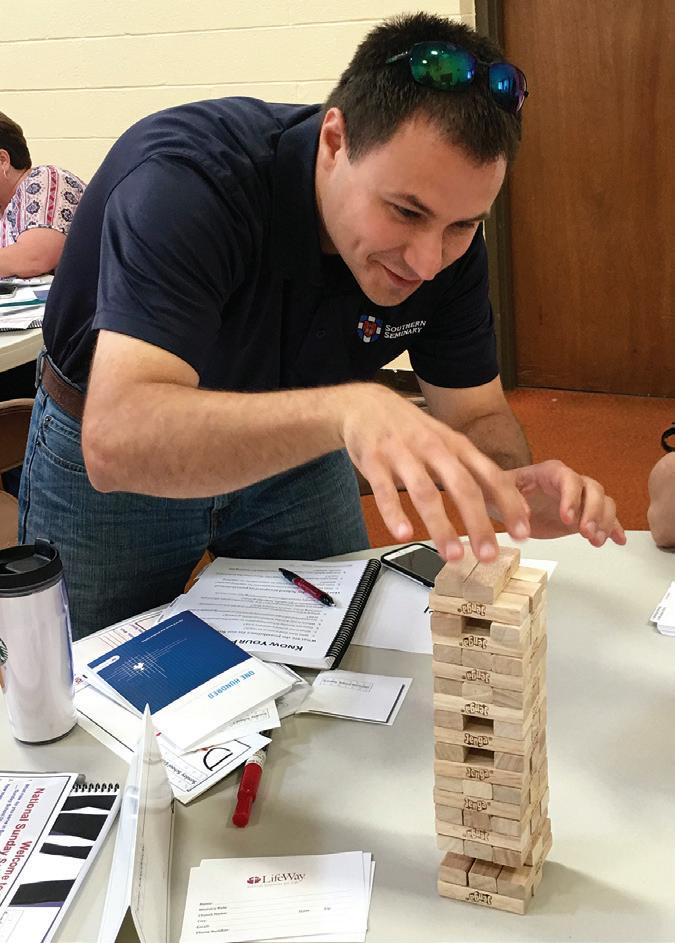
“The Church Planting Team regularly prays Luke 10:2 (or Matthew 9), where Jesus acknowledges ‘The harvest is plentiful, but the laborers are few’ and then challenges us to ‘pray earnestly to the Lord of the harvest to send out laborers into his harvest,’” said Kicklighter, associate executive director for church planting.
“As we have prayed, God has blessed us with a season where he has provided ‘laborers.’”





Some endorse candidates, some don’t. Here’s why.
CONVENTIONAL WISDOM
Snapshots from the world of Illinois Baptists
Teenagers are taking an active role in their communities through hands-on service projects, according to a new Barna survey of their parents.
Not a ‘slacker generation’
How often does your teen volunteer?
once a week
What kind of group does your teen volunteer with?
–
the cooperative program

Sept. 2016
Giving by IBSA churches as of 09/23/16 $4,281,104
Budget Goal: $4,603,846
Received to date in 2015: $4,348,477
2016 Goal: $6.3 Million
The Illinois Baptist staff
Editor - Eric Reed
Graphic Designer - Kris Kell
Contributing Editor - Lisa Sergent
Editorial Contributors - Meredith Flynn Morgan Jackson
For questions about subscriptions, articles, or upcoming events, contact the Illinois Baptist at (217) 391-3119 or IllinoisBaptist@IBSA.org
The Illinois Baptist is seeking news from IBSA churches. E-mail us at IllinoisBaptist@IBSA.org to tell us about special events and new ministry staff.

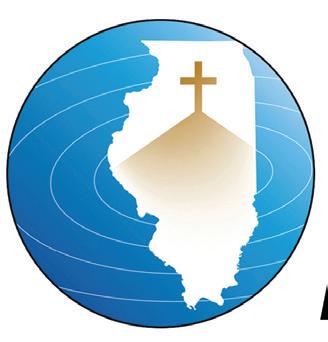
POSTMASTER: The Illinois Baptist is owned and published every three weeks by the Illinois Baptist State Association, 3085 Stevenson Drive, Springfield, Illinois 62703-4440. Subscriptions are free to Illinois Baptists. Subscribe online at IBSA.org
NATE ADAMSShould I stay or should I go?
Apopular hotel chain is running a television commercial that cleverly depicts several groups of people trying to decide whether or not to attend a wedding. One is a group of bridesmaids, who clearly aren’t thrilled about the turquoise dresses the bride has chosen. Another group is former boyfriends of the bride, wondering why on earth they all got invited. And one sad lady simply doesn’t want to see Uncle Joe dance in public again. I think it might be Uncle Joe’s wife. The musical background for the commercial is a rock song from the 1980’s. Over and over that song chants the simple question, “Should I stay, or should I go?”
As the November 2-3 IBSA Annual Meeting approaches, I imagine there are Illinois Baptists asking themselves that same question. For the first time in several years, the meeting is being hosted near Chicago, at Broadview Missionary Baptist Church. The drive will be quite a distance for those in other parts of the state, just as last year’s location in Marion was a long drive for northern churches. And of course some will not want to brave the congestion and the traffic. In fact, I don’t know any Chicagoland natives who look forward to that part. The message of the hotel chain’s commercial is that their comfortable, affordable hotels give even reluctant travelers reasons to go, rather than stay home. So let me suggest some reasons to go to the IBSA Annual Meeting this year.
First, the challenging theme of this year’s gathering is “Cross Culture.” The program will intentionally showcase the diversity of Illinois Baptists and also point to multiple cultures in our state that desperately need the gospel. There’s no better place in Illinois to receive the challenge to “cross culture” than in Chicago.
Second, because Chicago is our state’s largest and most diverse mission field, we all need to get more familiar with, and comfortable in, this world class city. We need more practice going there. We need to better understand its neighborhoods, its problems, its needs, and its people. We need to see and care about and partner with its churches.
Third, a lot of advance preparation has already gone in to making your stay in Chicagoland as easy as possible. Broadview is a wonderful, generous church, with lots of parking and lots of practice hosting large events. Catered meals have been arranged on site at the church to make the dinner hour easier and more convenient. Nearby hotels have provided very reasonable rates that include breakfast. And Broadview’s near west suburban location makes it a wonderful home base for seeing more of the city, either on your own or as part of two preplanned vision tours.
I could go on and on, but let me cite just one more reason, one that really applies to every Annual Meeting, regardless of location. It’s just very, very good for our Baptist family in Illinois to be together. Throughout the year, we as pastors and leaders and devoted church members work hard in our various local contexts to fulfill the Great Commandment and the Great Commission of Jesus. As the year draws to a close, it is good for us to assemble, and network, and be inspired, and remember that we are not alone in this mission.
Should you stay or should you go? If at all possible, you should go. It may surprise you what the Lord has done across our state over the past year. And it may surprise you how he and the fellowship of your brothers and sisters in Christ will inspire you for the year to come. I look forward to seeing you there.
Nate Adams is executive director of the Illinois Baptist State Association. Respond at IllinoisBaptist@IBSA.org.

We all need more practice going to Chicago—our most diverse mission field.
NEWS
Keith Stanford, 1930-2016
Former IBSA staffer remembered for ‘pastoral spirit’
Bethalto | Keith Stanford, who pastored several Illinois churches and served on the IBSA staff, died September 24 at the age of 86.

“Keith was a thoughtful, effective, and leading pastor in Illinois, and then a wonderful servant of pastors through his role here at IBSA,” said Nate Adams, executive director. “Keith’s unique insight and wisdom, his kind and caring pastoral spirit, and his deep, booming voice that always delivered God’s Word so faithfully, will truly be missed.”
During his many years of ministry, Stanford pastored Suburban Baptist Church, Granite City; First Baptist Church, Bethalto; and Logan Street Baptist Church, Mt. Vernon. He also served as director of missions for the former Madison County Baptist Association, and was interim pastor for 22 churches across the state.
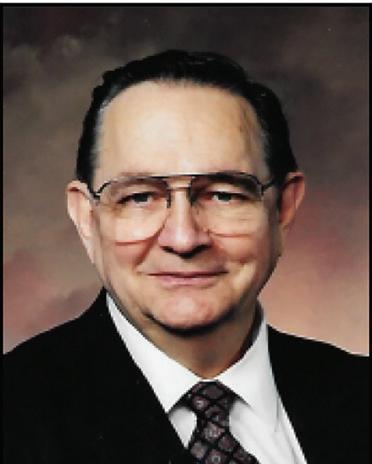
In 1986, Stanford went to IBSA as director of family and pastoral ministry, and later
led the Association’s church development department. Stanford retired in 1997.
“He was considerate of his coworkers, showed concern about what was happening in our lives, and could preach a powerful message,” remembered IBSA’s Sandy Barnard, who worked with Stanford. “I remember him as a man that spoke the truth in love.” Stanford is survived by his wife of 65 years, Helen, and their five children: Stephen and wife Roberta of Bethalto, Paul and wife Kathy of Green Valley, Thomas and wife Holly of Bolivar, Mo., Julia and husband Robert Nagamine of Kailua, Hawaii, and Mark and wife Laina of Chapmansboro, Tenn. He also is survived by many grandchildren and great-grandchildren, and his six brothers and sisters.
Memorials for Stanford may be given to the Illinois Minister’s Relief Fund or Baptist Children’s Home and Family Services.
Kentucky Baptists fight trafficking
Louisville, Ky. | The Kentucky Baptist Convention will not do business with hotels that fail to train employees to recognize and report human trafficking, Executive Director Paul Chitwood announced in September.
Chitwood set forth the convention’s position in a letter to potential vendors and listed several resources for free training. Among the list is the Kentucky attorney general’s office, which announced Sept. 20 it will seek to offer human trafficking training to Kentucky’s commercial drivers and truck-stop employees.
The Kentucky convention, the state’s largest religious organization encompassing a church membership of 750,000, intends for its internal policy to encourage corporate partners to provide employees with human trafficking awareness education.
Advocacy groups say human trafficking is a $32 billion industry that ensnares about 27 million people worldwide. Children are twice as likely as adults to be trafficked, with the average girl groomed for prostitution being between 12 and 14 years old.
“That isn’t prostitution. It’s human trafficking,” Chitwood said. “Going forward, our intention is that we will forego business with hotels that don’t participate in this training.”
According to the National Human Trafficking Resource Center, more incidents of human trafficking reported in Kentucky occurred at a hotel or motel than at any other location.
Chitwood said the convention wants to “partner with hotels that have taken steps to prevent human trafficking, establishments that exemplify great corporate citizenship, and are ready to put a stop to the use of hotels for criminal activity.”
IBSA churches also have been involved in raising awareness of human trafficking through domestic and international mission trips to work with organizations that are seeking to rescue victims. An advisory team is available to help connect churches with trafficking awareness and prevention resources. Go to IBSA.org/women and click on “Missions and Ministries.”
– From Baptist Press




Charlotte prays for peace
“Now is the time for heartfelt and sincere prayers, not political and personal-agenda driven rhetoric,” Pastor Phillip R.J. Davis posted on his church’s website in the wake of violence and protests in Charlotte, N.C.

His Southern Baptist congregation, Nations Ford Community Church, and others in the community held prayer meetings as their city continued to feel the aftermath of the police shooting of Keith Lamont Scott, and of subsequent protests that turned violent, resulting in the death of another man, Justin Carr.
Mark Harris, pastor of First Baptist Church, held a prayer meeting for 300 at noon the day after Carr was killed. “There will be no agenda, no program, no music, no preaching, but just men and women of God, on the altar, crying out to the father!” Harris said of the meeting. “These are serious days, and they require serious people who take seeking the heart and will of God seriously!”
SBC tags N.C. for 2023
The NCAA and Atlantic Coast Conference announced they will cancel upcoming events in North Carolina because of the state’s anti-discrimination law, but Southern Baptist Convention leaders are moving forward with plans to hold their 2023 annual meeting in Charlotte.
The North Carolina law, adopted in the spring, does not include sexual orientation or gender identity among legally protected classes, and also requires individuals in state buildings to use restrooms that correspond with the sex listed on their birth certificates.
 – Baptist Press
– Baptist Press

From the front: metro east
Continued from page 1
NET Community Church in Staunton, Collinsville Community Church, and City of Joy Fellowship Church in East St. Louis held their launch services on September 18—with no coordination between the churches and no specific reason for all choosing the same day. “Other than that God led each planter independently to choose this date for launch,” said Church Planting Strategist Eddie Pullen “unbelievable.”
Derrick Taylor, pastor at NET, said 176 people attended his church’s service, and several signed up to serve in various areas of ministry. Many who attended had no church home or hadn’t been to church in a long time.
“Jesus was definitely made famous, and I’m certain many heard directly from the Holy Spirit,” Taylor said. “Overall, it was a beautiful day of marriage to the bride of Christ.”
David Seaton, pastor of Collinsville Community Church, also shared encouraging news from the big day. With about 105 in attendance, Seaton said the service went smoothly and people seemed very encouraged and excited about the vision of where the church is going.
And with the annual Collinsville Italian Street Fest going on the Friday and Saturday prior to launch, the timing couldn’t have been better. The church had the opportunity to be in the parade, where thousands and thousands of people lined the streets. They threw out candy and passed out over 1,500 reusable water bottles labeled with the church’s logo.
IBSA board meeting Achievements,
aspirations reported
Focus on budget, new churches, and cultural challenges
Springfield | The September 15 IBSA Board of Directors meeting was a mix of encouraging news about ongoing ministries and challenges facing Baptists in the state.
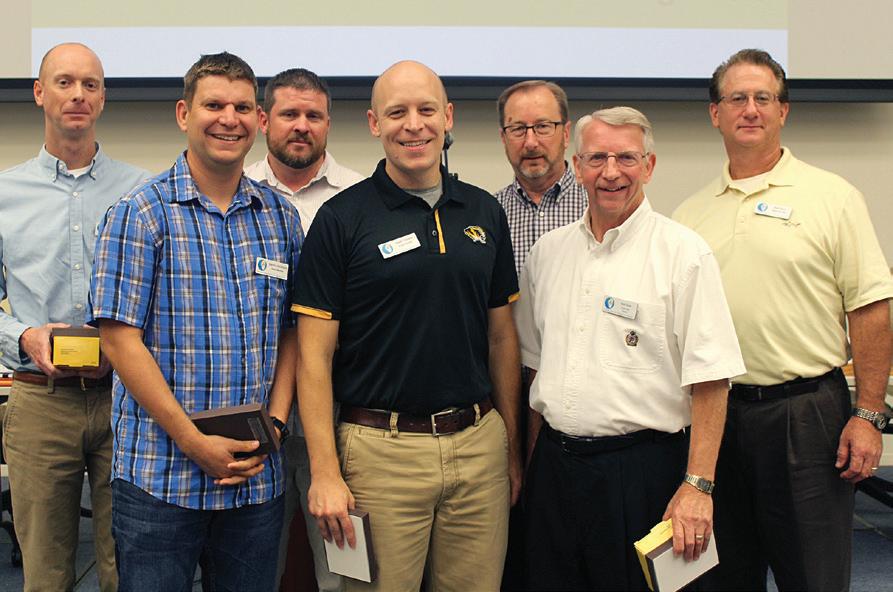
IBSA Executive Director Nate Adams encouraged the board to invite their fellow church members to attend the IBSA Annual Meeting and Pastors’ Conference November 1-3 in Broadview, a suburb of Chicago. The theme of this year’s conference is “Cross Culture,” which will explore the multitude of cultures and gospel opportunities available not only in Chicagoland, but also the rest of Illinois.
“We’re trying to illustrate how diverse we really are,” said Adams. “To encourage us all to cross culture, not just to understand one another, but to take the gospel into neighborhoods where we don’t usually take it. We hope this will encourage us to greater evangelism endeavor and to take the gospel to people who are not like us.”
Adams hopes the meeting will “highlight and focus on how culturally diverse Illinois Baptist churches really are…But also to inspire greater missionary efforts to encourage people to reach out to other cultures.”
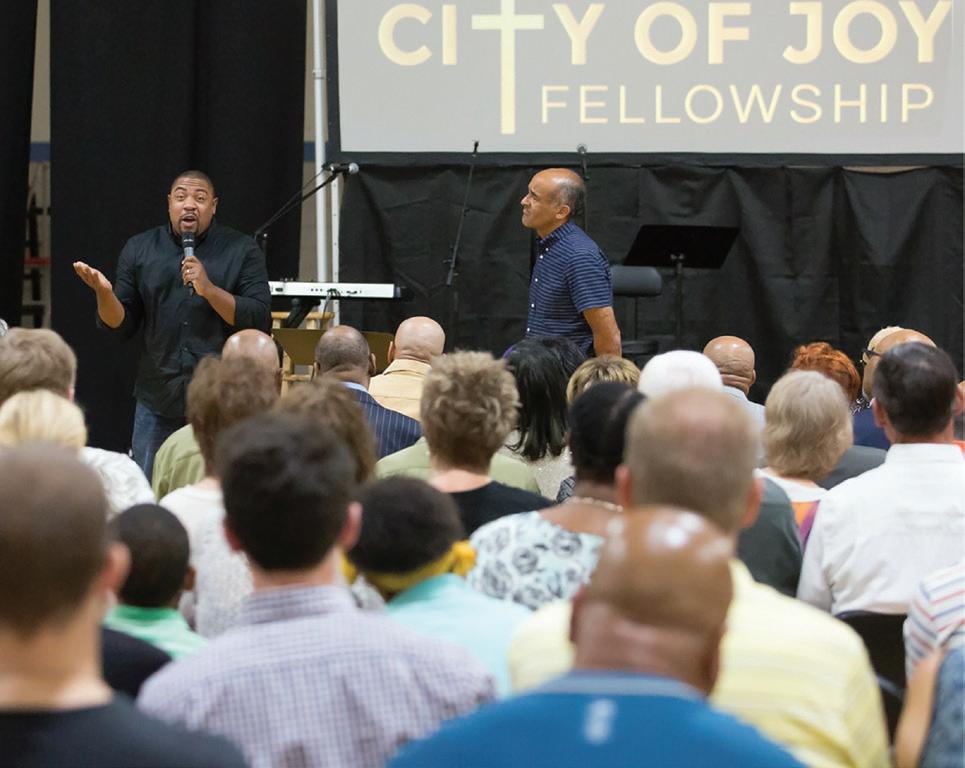
Describing church planting as “perhaps the steepest uphill climb we have,” Adams reported IBSA hopes to have planted 16 new churches by the end of the year, which is nine short of the goal. “But even though we don’t have the quantity…that doesn’t mean there are not quality church plants doing some great things in our state,” he said.
“To be effective in the work we do as Illinois Baptists we could fall over to the danger of compromise,” he cautioned. “The other danger is the danger of complacency. As we seek to plant new churches we have the danger of compromise…things you see other Christian groups doing that are attracting more people like accepting homosexuality, that is a danger.”
Even with those dangers around us, he said, “What makes it worth it is the people you’re doing it with. What makes it worth it is the end of the journey.”
Cliff Easter (First Baptist, Metropolis) to serve as Board Vice Chair and Luke Raczykowski (First Baptist, Carmi) to serve as Board Secretary.
Six board members ending their terms of service were presented with small thank you gifts (pictured).
Esther Eggley, ministry assistant for the Church Planting Team, was recognized for her upcoming retirement after 15 years of service.
Doug Devore, executive director of Baptist Children’s Home and Family Services, reported $266,000 was raised for the Mother’s Day Offering. The 2016 goal was $260,000. Devore, who is retiring in January after 44 years with BCHFS, also introduced his replacement, Dennis Hydrick. Hydrick began working alongside Devore Aug. 15, and will take sole responsibility for the role Jan. 15, 2017.
The pastor at City of Joy Fellowship Church and a Metro East St. Louis native, Kempton Turner said his congregation is praising God for the number of people who attended their launch service. Turner was sent out by Bethlehem Baptist Church in Minnesota, where well-known author and teacher John Piper served as pastor, and where Turner served as senior high pastor.
Each of the newly launched churches is already thinking about who they can send out to plant again in the next location, Pullen said. “These three planters are godly men and they have a heart to see their communities saved.
“September 18 in the Metro region is a very special day. I am so grateful for what God is doing here and [for] the faithfulness of the planters. And I can only imagine the impact these churches will have immediately and for eternity.”
He also shared about significant updates to Streator Baptist Camp saying, “If you haven’t been to Streator Baptist Camp lately, you haven’t been to Streator Baptist Camp.” More than $90,000 in improvements have been made to the camp. The old bunk house has been gutted and is currently undergoing renovation.
Adams told the board the association’s newspaper, the Illinois Baptist, was named the Best Christian Newspaper in 2016 by both the Baptist Communicator’s Association and Evangelical Press Association. “No other paper has ever won these awards in the same year,” he shared.
In other business:
Members elected Mark Davis (Woodland Baptist, Peoria) to serve as Board Chair,

The board approved a new cooperative agreement with the Baptist Foundation of Illinois. The agreement provides $116,901 through the 2017 IBSA budget in the form of staffing, office space, and support services, to assist in BFI operations. BFI no longer requires additional support for travel, promotion, and other operational assistance from IBSA.
The board approved two overspends. The first, for up to $10,000 to be allowed for the properties budget related to the maintenance of the HVAC units and damaged windows at the IBSA Building. The second, for up to $40,000 due to a significant increase in the number of IBSA children’s camps (two additional weeklong sessions) and the number of participants (more than 100 students) this summer, compared to the amount originally budgeted.
The board approved the 2017 Cooperative Program budget of $6.3 million, the same as in 2016. If approved by messengers at the Annual Meeting in November, IBSA will forward 43.5% of Cooperative Program monies to the Southern Baptist Convention, an increase of a quarter-point, with 56.5% remaining for missions work in Illinois.
Recovery enlists Baptists nationwide
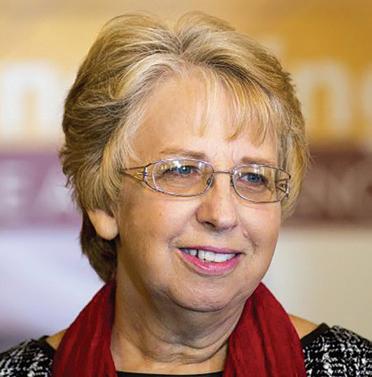
Exchange of ideas
Southern Baptist ethicist Russell Moore met with President Barack Obama and other faith leaders in September to discuss prison reform, and said the President was “very receptive to everything that we were saying, including the importance of faith-based ministries to prisoners.”
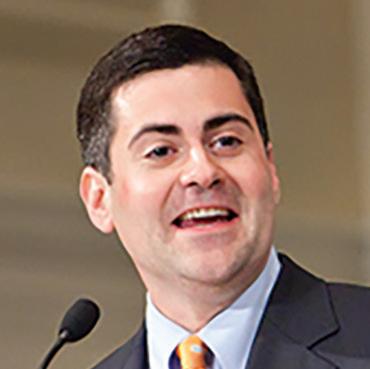
Baton Rouge, La. | Reality is setting in: The flooding in Louisiana was worse than many people realized, and recovery will take much longer than predicted. So, Southern Baptists nationwide are being called to join the relief effort.

The North American Mission Board is leading an effort to help Louisiana flood survivors rebuild and to assist churches and individuals who want to serve. The initiative, under NAMB’s Send Relief ministry, began Oct. 1.
“We’re developing a recovery plan to help Louisiana residents, pastors, churches, and other buildings damaged by extreme flooding,” said Mickey Caison, NAMB’s Southern Baptist Disaster Relief (SBDR) executive director. “The Send Relief plan includes a facility to house 300 volunteers as they aid those in crisis. Another part of what’s in the works concerning this year-long project [is] collegiate opportunities during students’ Christmas and spring breaks to help serve and rebuild Louisiana.”
The initiative is similar to those NAMB facilitated in the wake of Hurricane Sandy, Hurricane Katrina, Detroit flooding, and the Colorado floods and wildfires. While mudouts, clean-ups, and feedings are ongoing now, the one-year recovery plan will move into the rebuild stage.
So far in the response to the historic midAugust flooding in south Louisiana, SBDR team members and chaplains have made 1,345 gospel presentations and seen 171 people respond by placing their faith in Christ for salvation. SBDR teams also have prepared more than 657,000 hot meals.
“A lot of the residents are dealing with Post Traumatic Stress Disorder [PTSD] from the flood,” Caison said. “They’re resilient people who want to move on with their lives, again. Many escaped the flooding in New Orleans just to have it happen to them again here. It’s heartbreaking but we’ve got Southern Baptist chaplains as well as local pastors offering up spiritual and emotional support to those suffering from PTSD.”
In August and September, Illinois Baptist Disaster Relief sent six teams of flood recov-
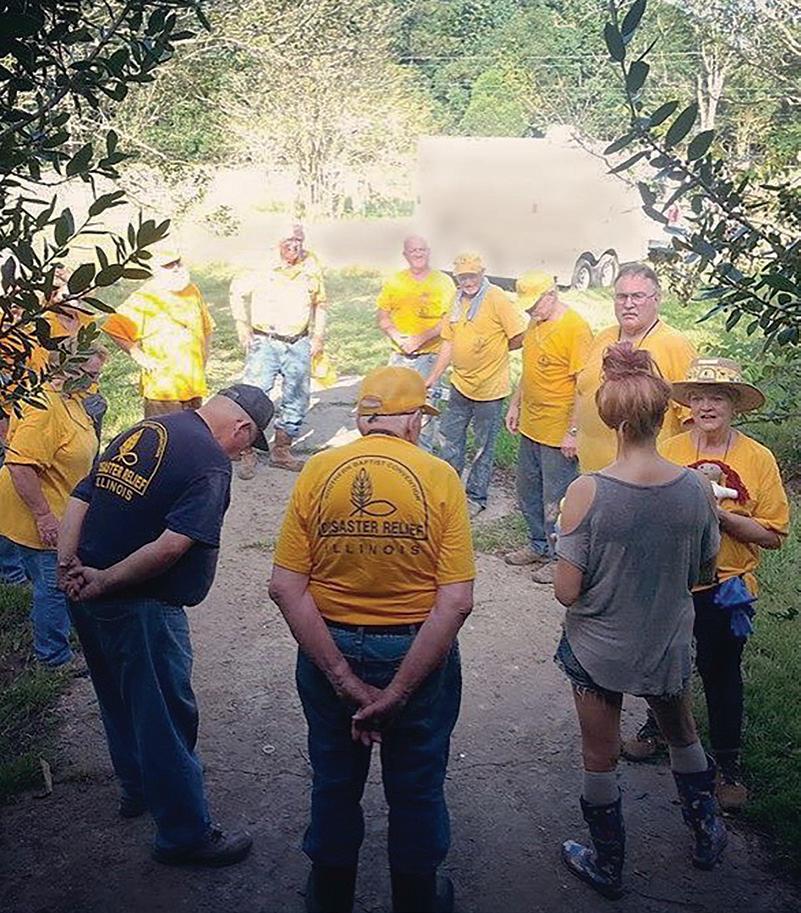
ery and chaplaincy volunteers to Louisiana. Another team is serving in October with the possibility of two more in November.
Illinois Disaster Relief is accepting gifts to help mobilize Illinois volunteers and equipment. To give, send a check payable to Illinois Disaster Relief to: IBSA, P.O. Box 19247, Springfield, IL 62703. Or, donate online at www.IBSA.org. All donations are tax deductible.
Now is also a good time to join the Disaster Relief team. IBSA has over 1,600 trained volunteers who serve as part of the Southern Baptist Convention’s Disaster Relief ministry. The next training will be October 14-15 at Lake Sallateeska Baptist Camp, near Pinckneyville.
For additional information visit IBSA.org/ DR, call Illinois Baptist Disaster Relief Coordinator Dwayne Doyle at (217) 391-136, or e-mail DwayneDoyle@IBSA.org.
Moore, president of the Ethics and Religious Liberty Commission, was also one of several faith leaders who sent a letter to Republican leadership last month urging the passage of federal sentencing reform laws and other legislation that has reduced recidivism and crime rates at the state level.
Race against time
Samaritan’s Purse and evangelist Franklin Graham will release a documentary next spring recounting the 2014 Ebola epidemic and the race to save two missionaries who were infected by the virus. “Facing Darkness,” set to be shown in select cities on March 30, 2017, tells the story of Kent Brantly and Nancy Writebol, who both contracted Ebola while working in Liberia, and how aid workers and organizations worked together to save their lives.

Creature comfort
Mourners at a New York funeral home receive an extra measure of comfort from Lulu, a therapy dog who “prays” with grievers by putting her paws on them and tilting her head down. The goldendoodle is an “added source of comfort” and “a calming presence” to people who are grieving, says her owner, Matthew Fiorillo.

– Baptist Press, The Christian Post, WashingtonPost.com
Get breaking news in The Briefing online, posted every Tuesday at www.ib2news.org.
Salaries up, benefits down
Nashville, Tenn. | Compensation for full-time Southern Baptist church staff members has exceeded the cost-of-living increase over the past two years. However, health insurance coverage continues to decline, according to the 2016 SBC Church Compensation Study.
The biannual study is a joint project of state Baptist conventions, GuideStone Financial Resources and LifeWay Christian Resources. Compensation and congregational data is collected anonymously from ministers and office/custodial personnel of Southern Baptist churches and church-type missions.
The compensation study is helpful for both pastors and churches, especially those in the process of determining a salary and benefits package for new staff members, said IBSA’s Sylvan Knobloch
“The calling of a new pastor or staff member is an exciting time for both the minister and the church. But coming to an agreement about adequate and fair salary can be difficult for the parties,” said Knobloch, director of church leadership development.
“The Salary Compensation Survey provides the pastor with a neutral and easily accessible database of salary information. The minister, by reviewing it, can determine how others with similar education and experience are compensated. The knowledge
allows the minister to make wise decisions for his family.”
The study also helps church finance and personnel committees determine appropriate compensation for current staff members, Knobloch said.
The 2016 study found compensation (salary plus housing) increased 3.4% for full-time senior Southern Baptist pastors over the last two years, 4.3% for full-time staff ministers, and 2% for full-time office personnel.
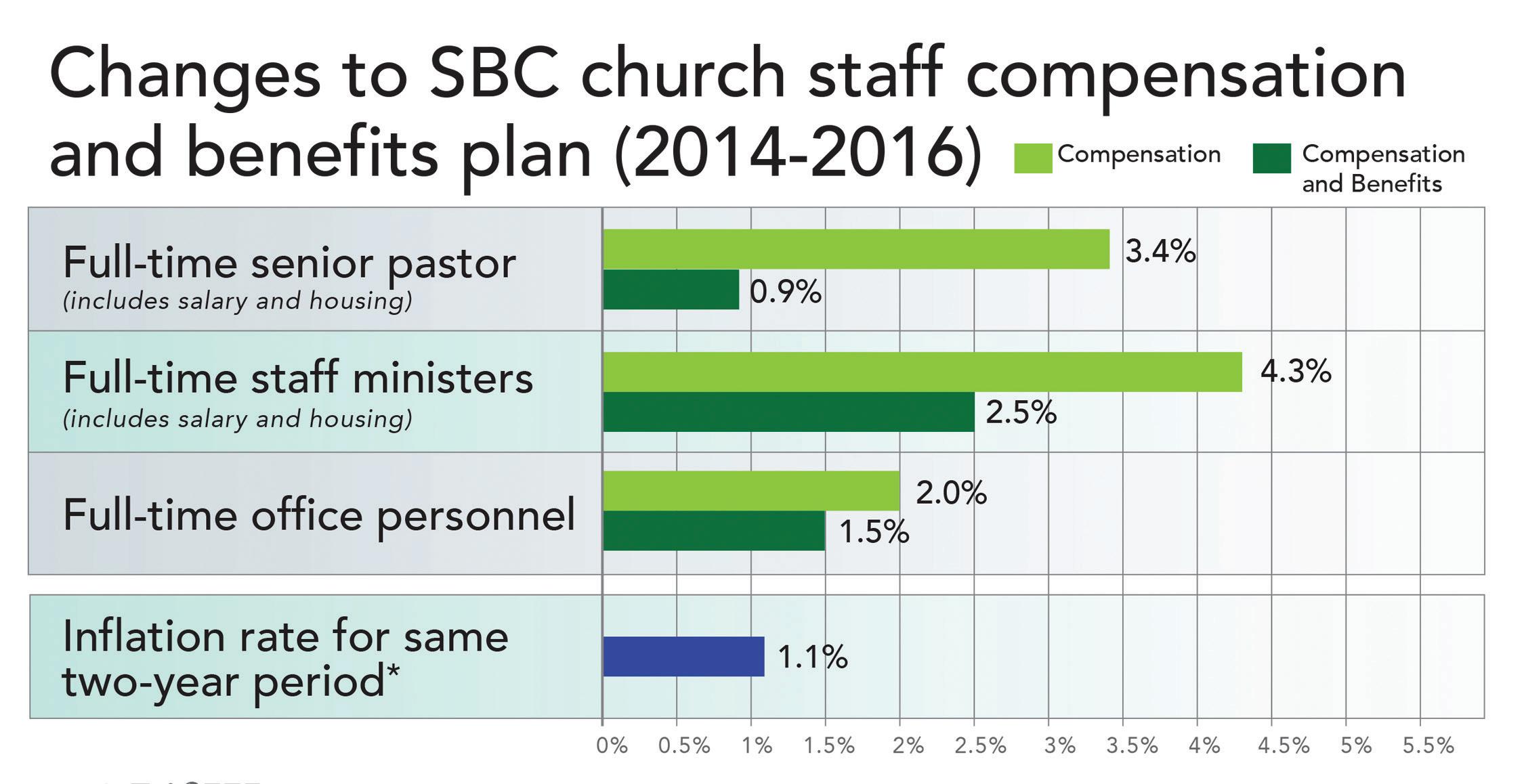
The U.S. Department of Labor’s Consumer Price Index (CPI) for the same two-year period increased only 1.1%.
Factors correlating with compensation for senior pastors include education level, weekly church attendance, and tenure at their current church, as well as total years of experience. Those with a bachelor’s degree earn an average of $4,040 more than otherwise equivalently qualified pastors without a college degree. Master’s and doctorate degrees correspond with incremental compensation increases of $2,171 and $11,151, respectively. Seminary graduates have an additional increase in average compensation of $4,706.
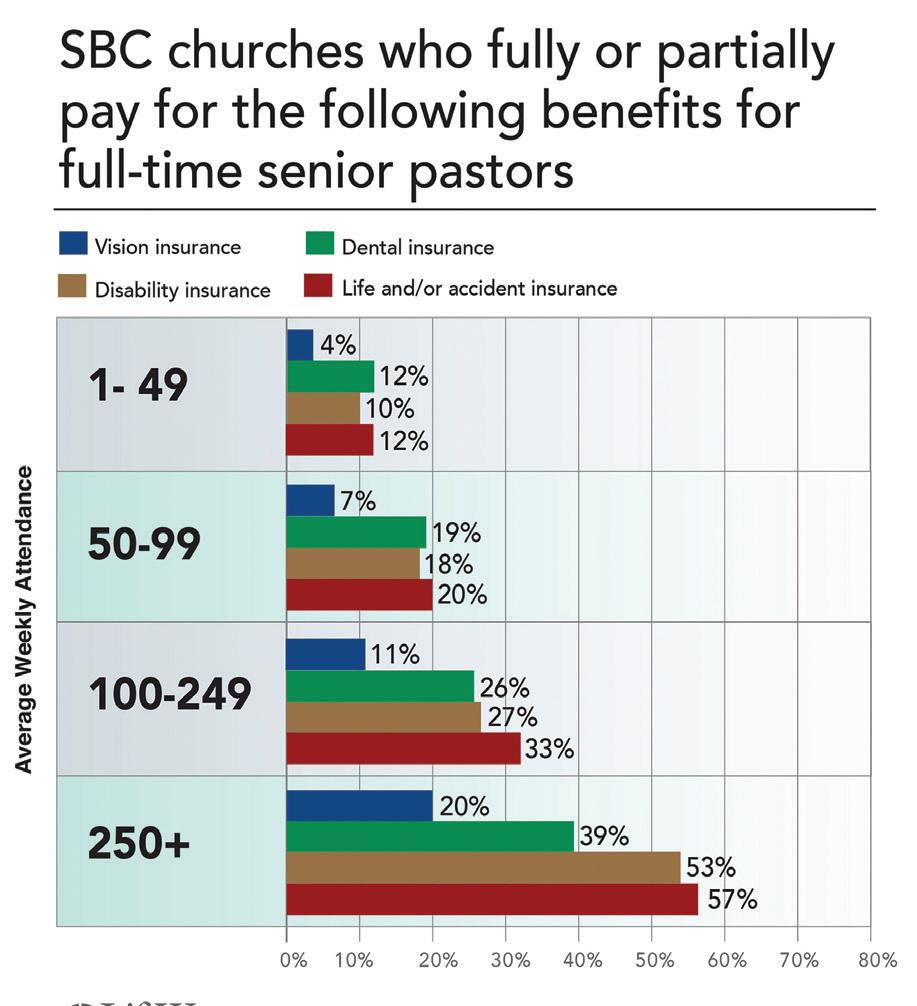
Scott McConnell, executive director of LifeWay Research, pointed out that despite increases in compensation, fair wages take into account wages at comparable churches, increased experience and education, and cost of living. “While inflation has been lower this last year, it is still true that the dollars churches paid last year don’t buy as much,” McConnell said. “Without a raise, you are actually paying less.”
Benefits declining
Overall, the value of the entire pay package (salary, retirement, housing, and other benefits including insurance) for senior pastors (0.9%) has not kept pace with inflation, even though the pay package for full-time staff ministers (2.5%) and office personnel (1.5%) has exceeded inflation.
Only half of churches participating in the survey provide health insurance coverage for senior pastors, down from 60% two years ago and 64% in 2012.
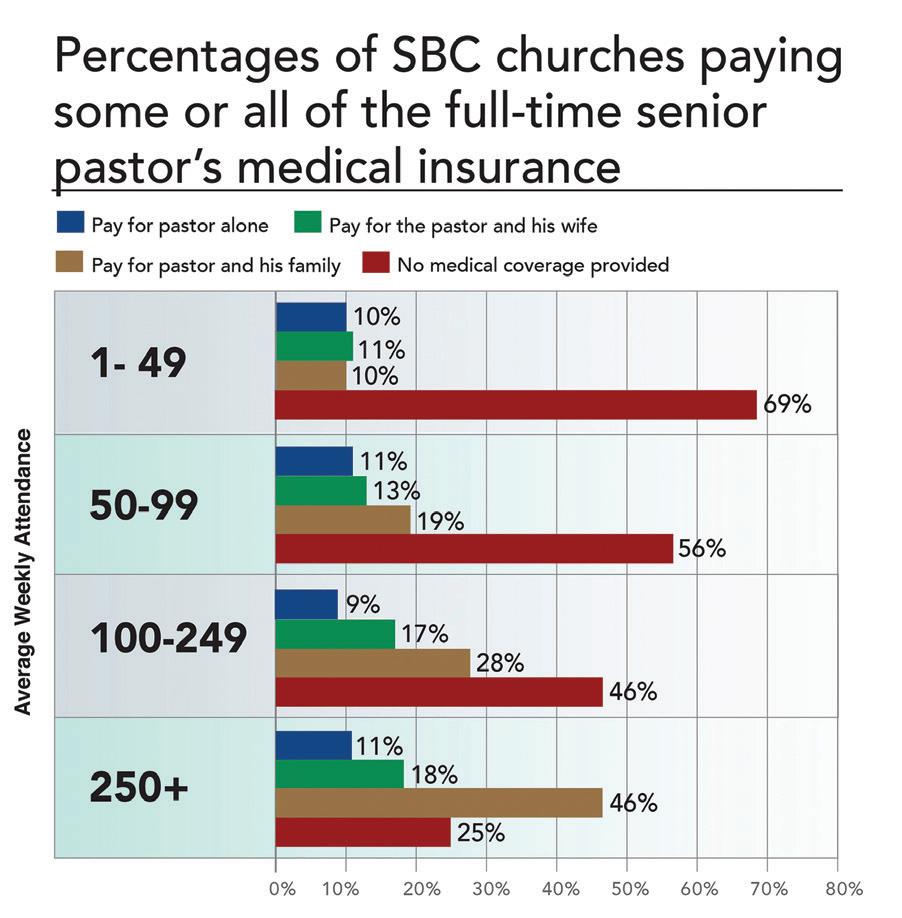
“While recognizing these trends, and the impact of Obamacare, GuideStone continues to advocate for churches to support all staff members with this important benefit,” said Scott Charbonneau,
managing director of insurance plans for GuideStone, the Southern Baptist Convention’s benefits entity. “Further, GuideStone has reduced the access point for its insurance plans down to a minimum group size of only two employees with multiple plans available, including a low-cost value plan.”
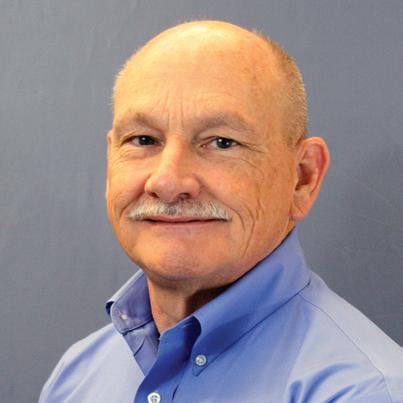
One-fourth of churches pay for medical insurance for the senior pastor and his family, 15% provide for the pastor and his wife, and 10% provide only for the pastor.
Although a larger weekly attendance correlates with churches providing senior pastors with health insurance, one-fourth of churches with 250 or more average attendees do not provide health insurance. Conversely, nearly one-third of churches (31%) with less than 50 in weekly attendance do provide their pastor with medical coverage.
Some churches also provide additional insurance benefits to senior pastors, including life and/or accidental insurance (29%), disability (26%), dental (24%), and vision (10%), although each is a few percentage points less than reported in 2014.
A number of factors also impact the amount of vacation senior pastors receive. Larger churches tend to give pastors more vacation, with otherwise equivalently qualified pastors averaging one additional day for every 448 attendees. Pastors with a bachelor’s, master’s, or doctorate degree add an average of one, two, or four vacation days, respectively, over those with some college or an associate degree. Seminary graduates, on average, also receive one additional vacation day.
The 2016 online survey was open from December 2015 through May 2016. Data from more than 8,000 full-time Southern Baptist respondents is available at LifeWay.com/CompensationSurvey.
The survey also obtained compensation data for bivocational pastors and part-time custodial and office personnel. This data is standardized by the median number of hours worked to allow churches to more easily compare their part-time employees with these averages.
GuideStone provides resources for churches seeking to establish, restructure, or evaluate pay and benefit packages for ministers and other staff. The free resources can be found at guidestone.org/ CompensationPlanning.
Study shows only half of SBC senior pastors receive health coverage
IN FOCUS
Pastors and politics
In a divisive election year, some pastors are making their opinions public. But who wants to hear them?
The presidential race is tightening and most of the “undecideds” are making up their minds.
After months of debate over how to vote, or whether to vote at all, evangelicals are hearing a call from leaders to vote, rather than skip balloting. But a new survey shows if Americans are seeking political advice, they aren’t likely to be looking to pastors for an endorsement. Still, some pastors feel compelled to speak up.
Only two-in-ten Americans (19%) say it is appropriate for pastors to publicly endorse political candidates during a church service, according to a poll conducted by LifeWay Research. A larger percentage, four-in-ten (43%), say it is appropriate for pastors to endorse candidates outside of their role at church.
With the election just over a month away, some pastors are counseling people of faith on how to think through specific issues related to their vote, while others, like First Baptist Church of Dallas Pastor Robert Jeffress, haven’t shied away from offering more specific advice.
Jeffress, a member of Donald Trump’s committee of evangelical advisors, said in a Sept. 9 Fox News appearance that conservative Christians who don’t vote in November based on moral principle are “namby-pamby, pantywaisted, weak-kneed Christians.”
He continued, “Will you please tell me what great moral principle there is in the universe that would allow a [pro-abortion], anti-religious liberty candidate like Hillary Clinton to become the president?”
Clinton, for her part, also has received endorsements from faith leaders, including a group of 28 African American pastors who announced their support in January.
Meanwhile, many faith leaders have warned against polarizing speech throughout the increasingly volatile election cycle. Southern Baptist Convention President Steve Gaines told Baptist Press in September that political rhetoric can inhibit evangelism.

“Christians must at times be prophetic. But we never have a license to be pejorative or denigrating,” said
Continued on page 8
nbcdfw.com
Gaines, pastor of Bellevue Baptist Church in Memphis.
“If any Christian, especially a Chris tian leader, castigates and attacks a political candidate, that Christian has crossed a line and has sinned,” Gaines said. “The litmus test should be, ‘Would that person be open to me sharing the gospel with him/her after I make this comment?’ If the answer is no, then keep silent, even if it sounds ‘prophetic.’”
‘Pulpit freedom’
The view expressed by a large majority of Americans that pastors shouldn’t endorse candidates extends to churches, according to the LifeWay survey. Three-quarters of Americans agree it isn’t appropriate for churches to make political endorsements, and 81% say they shouldn’t use their resources to campaign for candidates.
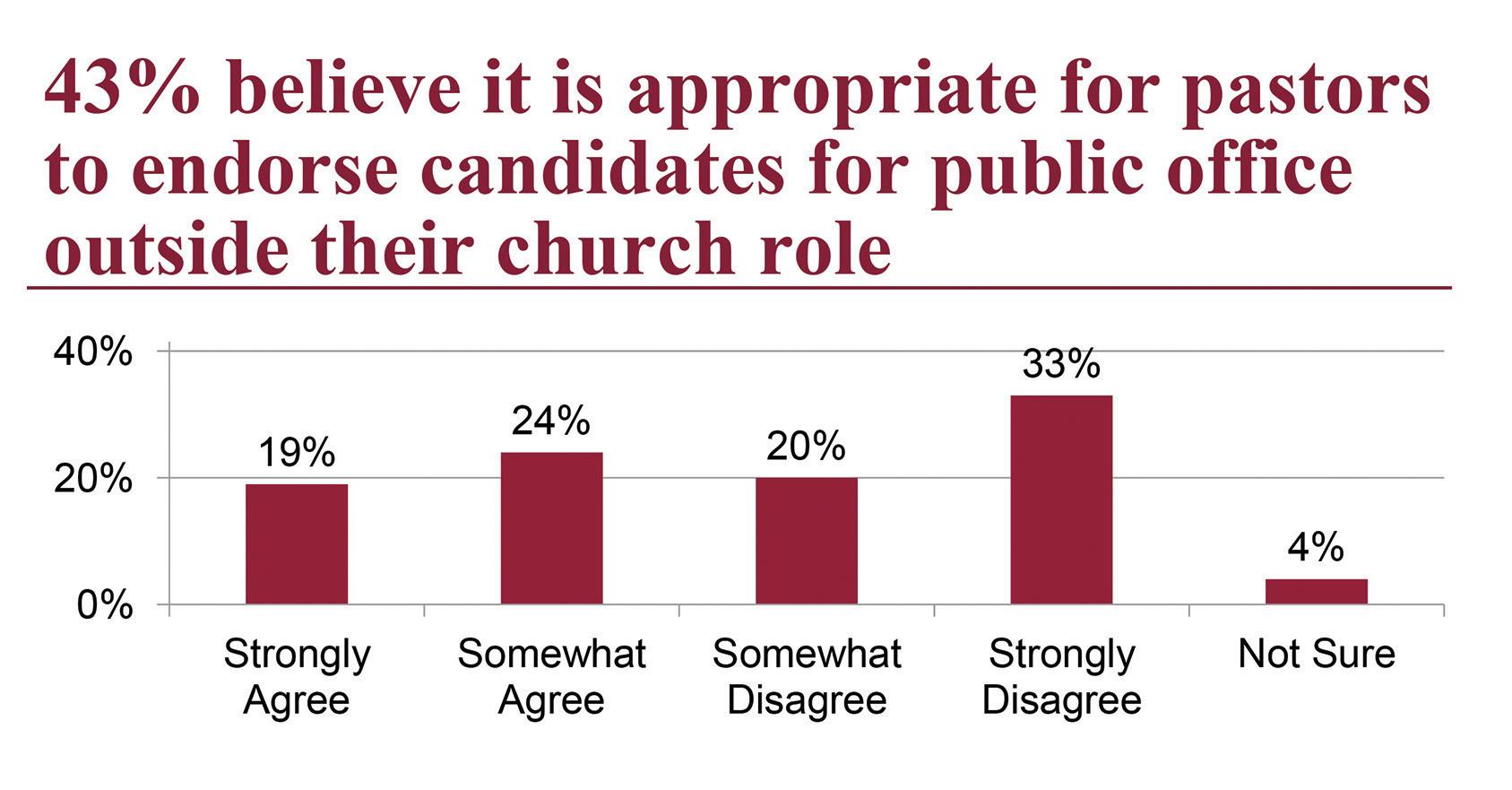
But fewer Americans believe churches should face negative repercussions for their involvement in political campaigns. The LifeWay survey found only 42% of people believe churches should lose their tax exempt status for publicly endorsing candidates.
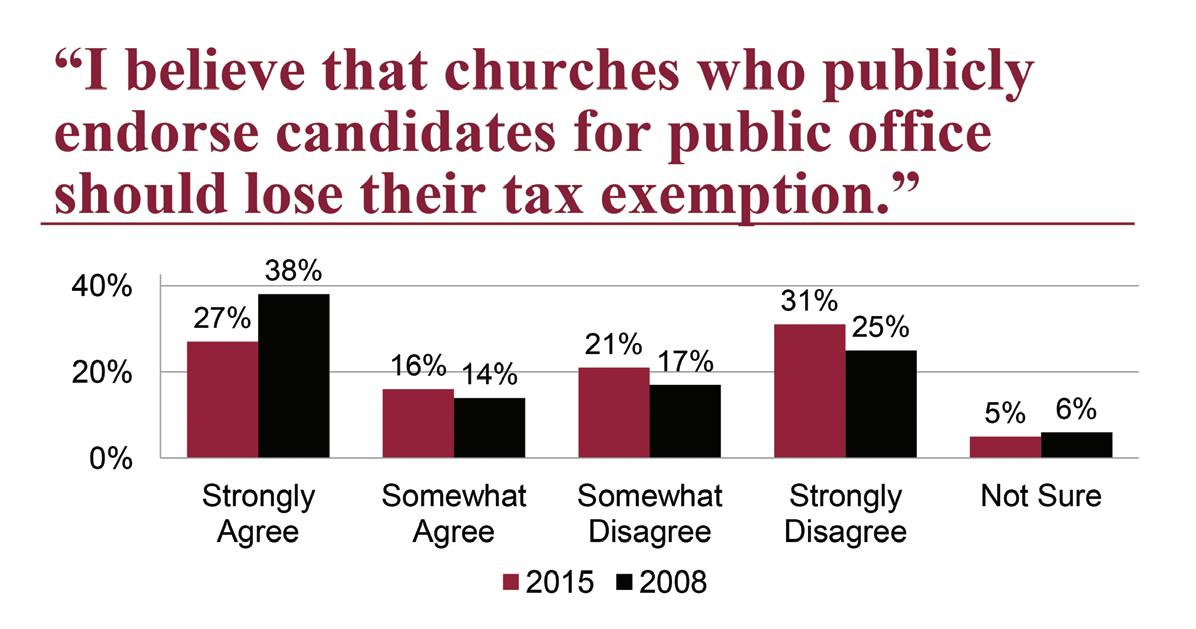
“Endorsements from the pulpit are unpopular and most Americans say they are inappropriate,” said LifeWay Research President Scott McConnell. “But they don’t want churches to be punished for something a pastor said.”
An August survey by Pew Research found more pastors may be speaking on the issues, rather than specific candidates. According to the Pew study, 64% of recent churchgoers have heard their pastor speak out publicly about at least one social or political issue, including religious liberty, homosexuality, abortion, immigration, environmental issues, or economic inequality.
Fewer said their pastor had spoken in favor of or against a particular candidate, although black Protestant respondents were most likely to have heard their pastor do so. According to Pew, 29% of black Protestants who have attended church recently have heard their pastor speak in favor of a specific candidate—mostly Hillary Clinton—while the same
share has heard their pastor speak against a candidate—mostly Donald Trump.
At issue whenever pastors or churches endorse a candidate or otherwise aid a campaign is the Johnson Amendment. The 1954 amendment, named for then-Senator Lyndon Johnson, changed the U.S. tax code to preclude churches and other non-profit organizations with 501(c)(3) status “from directly or indirectly participating in, or intervening in, any political campaign on behalf of (or in opposition to) any candidate for elective public office,” according to the website of the Internal Revenue Service.
In a July address, Trump pledged to “get rid of” the Johnson Amendment, pledging “to let Christians and Jews and people of religion talk without being afraid to talk.”
Since 2008, some pastors have been publicly defying the Johnson Amendment on “Pulpit Freedom Sunday,” an annual effort sponsored by Alliance Defending Freedom. The non-profit organization also has created “Pastors, Churches & Politics: A Legal Guide for Ministries on Political Engagement.” The free resource is available at adflegal. org/politics-and-your-church.
‘Start looking up’
Despite the fact that most Americans don’t think it’s appropriate for pastors to make political endorsements, some still make them.
The group of pastors who endorsed Clinton in January cited “her experience, long commitment to and understanding of the key issues their congregations are facing, and inequalities facing the African American community,” the Clinton campaign reported in a press release.
Trump’s evangelical supporters include Liberty University President Jerry Falwell, Jr., and Robert Jeffress, who followed up his recent Fox News comments with a clarification to Baptist Press.

“I never said people who don’t vote for Trump are this or that. That wasn’t my comment,” Jeffress said.
“It’s hypocritical for conservative Christians to say they believe in the sanctity of life and the sanctity of marriage and religious liberty, then sit at home and not vote, or throw away their vote on a thirdparty candidate and not elect a candidate like Donald Trump who has said he’ll appoint conservative justices to the Supreme Court, a candidate who says he’s pro-life, a candidate who says he believes Christians are being marginalized in society today,” Jeffress said.
Even as the faith leaders who have publicly endorsed candidates have made known their preferences, their opinions still vary widely: Some advocate Trump because of Clinton’s policies on abortion and religious liberty, among other issues. Others say Trump’s controversial comments and lifestyle decisions make Clinton the better choice. Still other leaders actually seem to favor the candidates they’ve endorsed, rather than just consider them a lesser evil.
Approaching November, Gaines advised Christians to be guided by “biblical convictions” in all areas of life, including how they vote.
“In my opinion, the three key moral issues in America today are (a) the sanctity of human life, (b) the sacredness of marriage and (c) the significance of racial respect/reconciliation,” Gaines said. The SBC President advised Christians to vote for candidates who are pro-life, those who uphold marriage as “exclusively monogamous and heterosexual,” and those who encourage respect and reconciliation with regard to race.

Christians should be hopeful in this political season, Gaines said. “The White House cannot send revival, nor can it stop revival,” he said. “Stop looking around and start looking up. The Lord is the source of your help and strength.”
– Compiled by Meredith Flynn, with reporting by Baptist Press and LifeWay Research
Opting out is no option After the vote
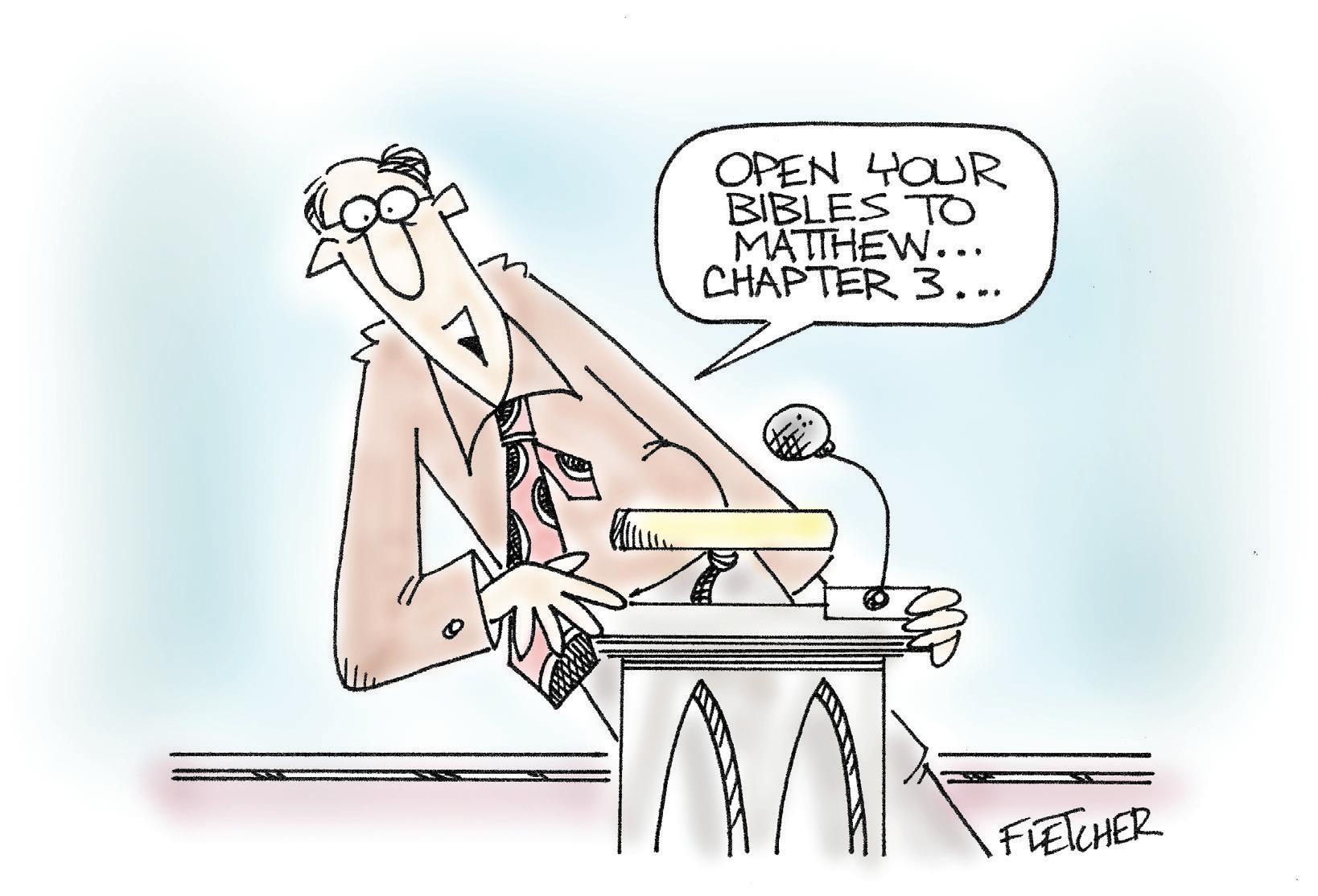
My freshman civics teacher in Harrisburg was Melton Ewert. Mr. Ewert impressed upon me that voting is a privilege that millions of people in other parts of the world are not allowed to exercise. In communist countries you can vote, but only for one party, only one slate of candidates. God has blessed America with the gift of self-government—a “government of the people, by the people, and for the people.” But this blessing also comes with tremendous responsibility.
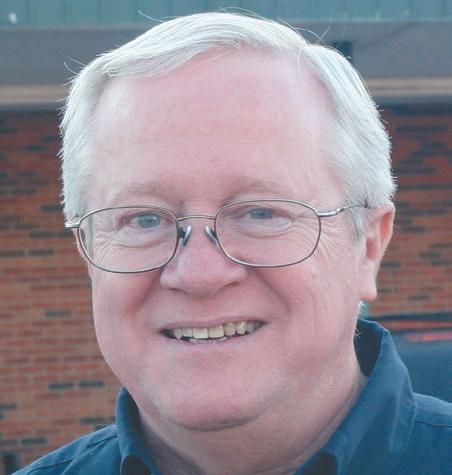
In a time of conflict over candidates and ideals, we as Christians have a duty and a moral obligation to be involved in the democratic process. We are called by our Savior to be salt and light. As salt we are to flavor the conversation of life with our Christian faith and values. As light we are to shine our light and point others to Jesus Christ
Imagine the impact we could have on our government, its leadership, and our nation if we all simply registered to vote and voted for biblical values. But of the 84 million professed Christians in America, less than half are registered to vote.
The patriot and educator Noah Webster said, “When you become entitled to exercise the right of voting...let it be impressed upon your mind that God commands you to choose for rulers just men who will rule in the fear of God. The preservation of a republican government depends on faithful discharge of this duty.
“If the citizens neglect their duty and place unprincipled men in office, the government will soon be corrupted; laws will be made not
for the public good so much as for selfish or local purposes; corrupt or incompetent men will be appointed to execute the laws; the public revenues will be squandered on unworthy men; and the rights of the citizen will be violated or disregarded.”
We can be grateful that God has given us specific guidance with which to qualify prospective civil leaders. When he instructed Moses to choose leaders for the Hebrews, God said, “Select from all the people able men, such as fear God, men of truth, hating covetousness; and place such over them to be rulers of thousands, rulers of hundreds, rulers of fifties, and rulers of tens” (Exodus 18:21, KJV). That guidance became the foundation for the choosing of leaders in ancient Israel.
If only Israel had followed God’s instructions they would have avoided the eventual selection of Saul as king, tall and popular, and a complete spiritual failure.
The application today is this: We must not be swayed by popularity, forcefulness, brilliance, good looks, or charisma. Rather, we must search our own hearts and motives, then seek God for discernment. Each of us bears a sacred duty to analyze, test, and make biblically-based decisions about the character of the candidates. We must choose men and women who meet God’s requirements and reject those who don’t.
And we must vote.
Stephen
After we prayerfully vote for our government leaders, Christians have a further responsibility to pray for those who are elected. Here’s a fresh idea for a small group or an entire church to impact governmental leaders.
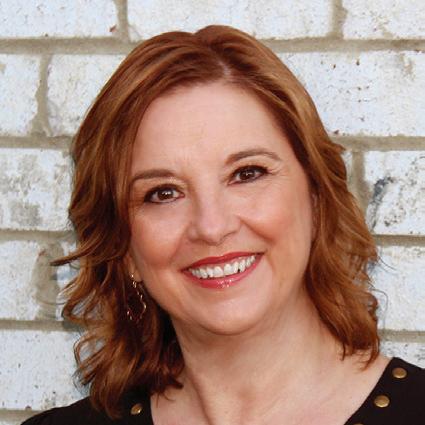
Step #1: Before Election Day, use sample voting ballots to create a list of governmental positions to be elected, including local, state, and national leaders.
Step #2: State the goal. As a church-wide project, various groups in the church will commit to pray faithfully for one specific elected leader, and to let that person know they’re praying. (If this is done as a smaller group, assign individual members of that group to pray for a specific leader.)
Step #3: Make prayer assignments. Each group who commits to pray will select an elected position from the list. They will intentionally pray for the person who is elected to that position. Involve as many groups as possible—Bible classes, committees, teams, music or sports or discipleship groups, deacons, small groups, and so on.
Step #4: Provide sample ideas, but leave flexibility in methods to accomplish their commitment. Some examples:
• Make a plan to mail a monthly or bi-weekly note from different individuals. It may include encouraging words, prayer, Scripture, and the name of your church and group.
• Purchase a Bible as a gift and write an encouraging note inside the cover to promise your faithful prayers. Members sign their names. After the election, emboss the leader’s name on the cover and deliver it.
• Prepare a card to mail to the winning candidate immediately after the election. Include a group photo, holding signs that read “God bless you,” “Thank you,” and “We are praying for you!”
• Post a reminder sign in your meeting room, i.e. “Our class prays for City Council Representative Gina Clasp.”
• In your group’s e-mail or mail correspondence, include a prayer reminder.
• Voice a prayer for that government official when your group meets.
Step #5: Use 1 Timothy 2:1-4 as a three-step prayer guide. First, ask God to help them. Next, intercede on their behalf. And finally, give thanks for them. We pray for believers as well as unbelievers in leadership. If the leader is not a believer in Jesus, that last verse provides an added incentive to pray. We pray for those with whom we agree and those with different views. God says pray, so we pray faithfully!
Proverbs 21:1 promises, “A king’s heart is like streams of water in the Lord’s hand: He directs it wherever He chooses.”
Picture this. A senior adult Bible group prays weekly for your U.S. Senator. The media team prays for the Governor. The choir prays for a judge. The seventh graders pray for a City Council representative. Every group in your church is intentionally praying for a specific elected official, and God hears those prayers. As soon as the winning candidates are announced this Election Day, get ready to pray for them.
© Diana Davis 2016, www.dianadavis.org
You have until Tuesday, October 11 to register to vote.
Voter fatigue: November turnout in question

Scare quotes and scared folks
For such a tiny punctuation mark, a quotation mark can pack a powerful punch.
Take for example a report published in September by the United States Commission on Civil Rights. The Commission’s September 16 report on nondiscrimination laws, civil liberties, and how the two are often at odds made a strong statement about two ideas Baptists hold very closely:
topsy-turvy, upside down. What used to be universally viewed as right is now almost always wrong, at least if you want to be on the ‘right side of history.’
But instead of being scared, maybe the answer is to take charge of the redefinition of the terms in question. The world outside the church, including the Commission on Civil Rights, may not be the only ones confused.
One month away from the presidential election, voters continued to express doubt about both Hillary Clinton and Donald Trump, with only a small percentage of Americans saying either candidate will make a “great” or “good” president.
33% of people said Democratic nominee Clinton would make a great/good president, while 39% forecasted her presidency as poor/terrible, according to polling by Gallup. Trump’s numbers were slightly worse, with 25% saying the Republican would be great/good, and 51% rating his potential presidency as poor/terrible.
One possible fallout of both candidates’ unpopularity: Fewer Americans say they are highly likely to cast a vote for president than in the last four presidential election years. 69% rate their chances of voting as a “10” on a 1-10 scale, compared to 76% in 2012 and 80% in 2008.
Younger voters express a big decline in voting likelihood, with only 47% rating their chance of voting a “10,” compared to 58% in 2012 and 74% in 2008.
– Gallup.com, Sept. 2016
“The phrases ‘religious liberty’ and ‘religious freedom’ will stand for nothing except hypocrisy so long as they remain code words for discrimination, intolerance, racism, sexism, homophobia, Islamophobia, Christian supremacy or any form of intolerance,” the report reads.
Southern Seminary President Albert Mohler and others quickly pointed out that the Commission used “scare quotes” around “religious liberty” and “religious liberty.” These single quotation marks indicate irony, or that the user doesn’t think the term is being used correctly.

What may not be as clear in the Commission’s 306-page report is what is the right way to use the terms. In an age when religious conviction no longer seems a valid defense, what do those words really mean? Do they mean anything at all?
Here’s where it’s easy to get scared. Where it’s easy to think that the world is suddenly
The Southern Baptist Convention’s annual meeting in June offered one example of the uncertainty: Ethics and Religious Liberty Commission President Russell Moore was questioned from the floor about how he could defend Muslims’ right to build mosques. His response cited “soul freedom,” the proudly held Baptist ideal that every person is accountable to God and is free to believe as he or she believes.
Like “religious liberty” and “religious freedom,” “soul freedom” is a layered, complicated concept. But thinking about liberty in terms of soul freedom—a God-given right and responsibility for every person—takes some of the focus off the culture’s misunderstanding of religious liberty, and the fear Christians may feel because of it.
In place of those fears, “soul freedom” reminds Christians where their ultimate hope lies.
MISSION
Cooperative Program supports
Church leadership development training leaders of Illinois churches more than 20,000 times in 2015, planting 23 churches in Illinois last year, and supporting 2,200 church planters and missionaries in North America. Jonathan De la O (below, left) planted Starting Point Community Church in Chicago in 2014.
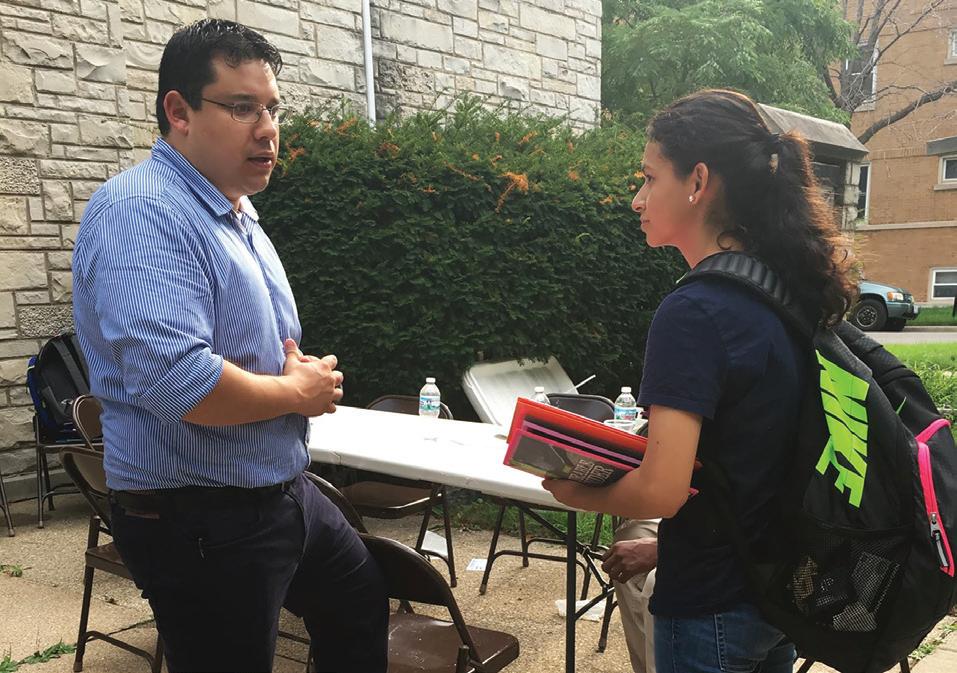
October is CP Month
Reinforcing Commitment
Tight church budgets require vigilance for gospel advance
Every pastor has had to answer this question: “Why do we give money to the national SBC? Aren’t there missions around here we should support?”
And as people without Southern Baptist background and younger people without exposure to unified missions giving enter into church leadership roles, pastors and dedicated church leaders have to be prepared to answer the question again. And again.
For new Baptists and a new generation.
Evangelism and compassion ministries, training IBSA churches and Disaster Relief chaplains to share the faith, and 3,800 chaplains nationwide. Plus campus ministries, youth evangelism events, kids camps, and ministries such as Christian Activity Center in East St. Louis (photo below).
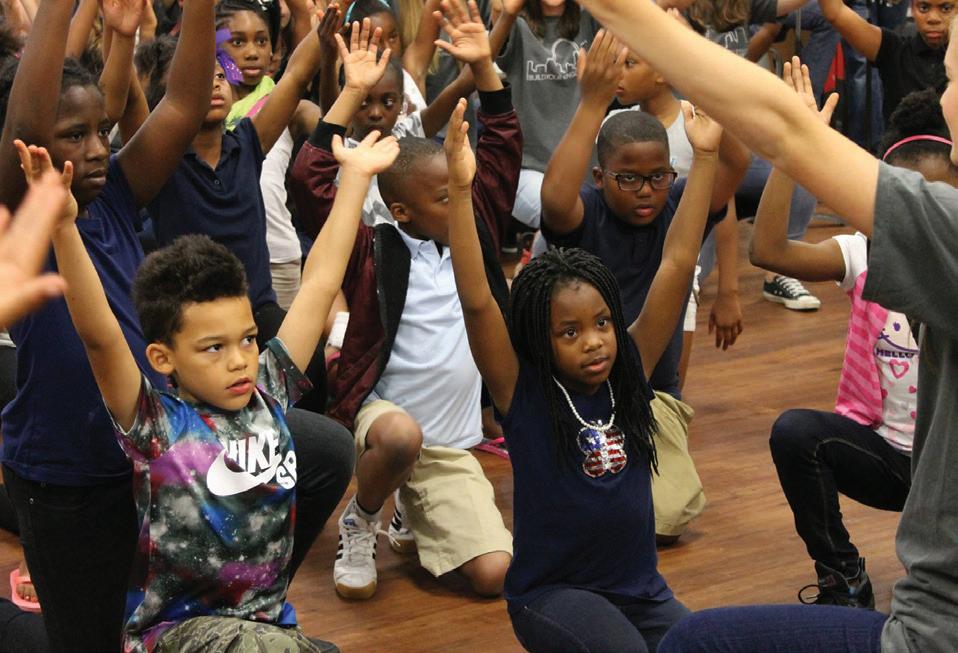
“Cooperative Program” isn’t the most enticing name for a missions support plan, but it is effective. For more than 90 years, this system of giving has put missionaries on fields in North America and worldwide, keeping missions and evangelism at the forefront of Southern Baptist commitment.
But maintaining that commitment—and advancing the gospel— requires vigilance on the local church level.
the Piedmont Baptist Association in the northwest part of the state.
“Although we may not be large enough to send missionaries to the ends of the earth,” Atkins said, “we are able to help send SBC missionaries through our CP giving.”
Many pastors and church leaders have to defend missions giving through CP every year—at budget season. But rather than chipping away at the CP percentage, the new trend is to increase missions giving. The “1% CP Challenge”—which SBC Executive Committee CEO Frank Page set forth four years ago—is continuing to stir churches upward in their Cooperative Program support by one percentage
The national SBC Cooperative Program budget for 2016-2017 is $189 million, which will support:
73.20% World Missions (NAMB & IMB)
Missionaries and mission teams
mobilizing 22,000 IBSA church members to their mission fields, and 3,600 missionaries through the International Mission Board (photo of Nepal).

The short answer to the question is this: “Our church doesn’t send money to the national SBC; we support missions in our state and globally through the Cooperative Program of the SBC. While we may choose to support some additional local mis sions and ministries over and above our gifts through CP, our percentage giving through the Cooperative Program has proven to be the most consistent and effective means of sending missionaries, training church leaders, and sharing the gospel in the modern missions era. It still is.”
A real-world example
When Brad Atkins became pastor of Powdersville First Baptist Church in South Carolina in 2006, upheaval in the congregation had ended its missions giving.
22.16% Theological Education
2.99% SBC Operating Budget
1.65% Christian Ethics and Religious Liberty Ministries
point of their budgets each year.
Since 2012, nearly 12,350 churches have responded to the 1% CP Challenge, some continuing for multiple years. The result is, after years of trending downward, cooperative giving by all SBC churches ticked upward last year, totaling $189.2 million.
Will
“The first thing I told them was that we had to start investing in the Kingdom,” said Atkins, who served as president of the South Carolina Baptist Convention from 2011-2013. Powdersville First Baptist, in a precursor to the 1% CP Challenge, initially budgeted 5% of its receipts through the Cooperative Program; today 10% of the church’s budget undergirds Southern Baptist national and international missions and ministries, while 3% is devoted to the cooperative ministry of the 50 churches in
Page is following up with “Great Commission Advance.” It’s a call for “every Southern Baptist and every Southern Baptist church living up to the high calling of disciplemaking, evangelism and missions, biblical stewardship, and fervent and effective prayer,” as Page defines the focus of a growing partnership between state conventions and SBC entities.
Simply put: “We follow Jesus, we love others like Jesus and we tell the world about Jesus,” Page said. Southern Baptists encompass “many faces, many accents, many languages, but we’re all reading from the
Continued on page 12

IBSA’s plan for advancing the gospel on our frontier inspire
cooperation of almost 1,000 partner churches and church plants for the support of missions in Illinois and around the world…
Continued from page 11
develop
leaders—pastors and church staff, church members and church planters—through leadership training and ministry skill development…
same Word, working for the same goal—to share the gospel with every person on the planet,” Page noted. The Cooperative Program enables every church “no matter its size and every group no matter its ethnicity” to do its part in the Great Commission task, which he underscores as “the single mission of the Southern Baptist Convention for more than 170 years.”
The Illinois connection
Southern Baptists in Illinois increased missions giving through CP in 2015, to $6.23 million from $6.1 million the previous year. IBSA Executive Director Nate Adams reported the increase in an annual report to local associations and churches this fall.
“Thank you for your partnership with the Illinois Baptist State Association,” Adams said. “We are almost 1,000 churches, church plants, and local associations, together advancing the gospel in Illinois.
“We’re spiritual pioneers in a state that is still a frontier for Baptist work, even in the 21st century. We’ve come a long way, but with at least 8 million lost people in the state, and growing percentages of non-Christians in our cities and among young adults, we have a lot yet to do.”
church growth with a variety of equipping opportunities and onsite assistance from consultants in ten zones…
evangelistic church plants and mobilize Illinois Baptists for missions here and around the world.
come a long way, but we still have a way to go
When Illinois became a state in 1818, fewer than 100 people lived in Chicago, and less than that at Calhoun. The hubs of activity were places such as Kaskaskia, on the banks of the Mississippi River. The town swelled to 7,000 when it became the first state capital for one year. Then bustling Vandalia was the capital for 20 years, until Abraham Lincoln and a few others had the capital moved to Calhoun in 1839. Calhoun had been renamed after Springfield, Massachusetts, a center of trade, creativity, and innovation. They had high hopes for their new Springfield—and for all of Illinois.
Watch “Our Frontier State” at IBSA.org/Frontier and share it with your congregation.
Teach the children well Adams’ report, “Our Frontier State,” is one of several resources available for use in local churches. IBSA has produced a bulletin insert on the Cooperative Program that can be downloaded. Or churches may request free copies by writing to IllinoisBaptist@IBSA.org.
The SBC Executive Committee has produced a new video series, “Not Alone,” to show church members how, by working together with 15 million other Southern Baptists, we can share the gospel around the world—and in our own backyard. The videos are available at a new website, www.talkCP.com.
– IB staff report, with additional reporting by Art Toalston, Baptist Press
Catholic priests came to the area early, following French trappers and traders into St. Louis and later Chicago, building a few churches and converting a few Native Americans. The trappers were largely unconverted. Baptists and some Methodists were on scene by 1781, starting the first Protestant congregation in Illinois and building a Baptist meeting house at New Design, across from St. Louis on the river.
Illinois was a frontier state 200 years ago. Today, in many ways, it still is.
Almost 13 million people live in Illinois. But in terms of faith, the state is wild and untamed. At least 8 million residents do not know Jesus Christ. As the population grows, the percentage who identify with any religion at all continues to decline.
The state’s population hubs are our largest mission fields, especially metro Chicago and
metro East St. Louis. Our cities are teeming centers of commerce and education, with growing populations of immigrant peoples.
The last census showed Hispanic and Asian populations are the fastest growing ethnic groups in the state. In fact, the Hispanic population grew in all but one of Illinois’ 102 counties.
In Illinois, nine people groups are unreached with the gospel because of language and cultural barriers, but literally millions of English-speaking and culturally mainstream people have never heard the message of salvation in a way they have understood and believed.
On our college campuses, for example, almost 900,000 students represent a mission field with enormous potential, and historically the lowest percentage of believers among young adults ever.
The cultural withdrawal from the Christian faith is felt all across Illinois—in cities and university settings, in small towns and crossroads communities. The northwest quadrant of Illinois is one of the leastChristian areas in the nation. And scattered across the state, there are nine counties that have no Southern Baptist congregation, 12 counties have only one, and many more have minimal evangelical presence.
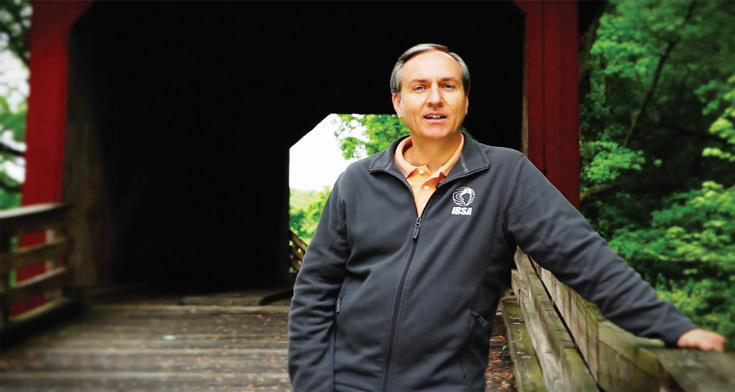
In 40% of Illinois counties, less than 1% of the population identifies as Southern Baptist.
By faithful, regular, systematic giving to missions through the Cooperative Program, Baptists together serve as missions pioneers, in our frontier territory in Illinois and around the world, wherever the gospel is needed.
How does the Cooperative Program work?
Of the $6.23 million IBSA churches gave in 2015

56.75% goes to church planting, missions, evangelism, leadership development, and church strengthening in Illinois.
15.2 million
Southern Baptists in 46,000 churches together support
43.25% goes to the national SBC, which then forwards just over 50% to the International Mission Board for global missions. The remainder funds North American missions and a small percentage helps educate the next generation of pastors and missionaries at six SBC seminaries.
3,645 International Mission Board field missionaries serving around the world and
5,684
North American Mission Board missionaries plus more than 3,800 chaplains serving in hospitals, prisons, and Disaster Relief.
The Faith Frontier Illinois has
Chicago-bound: Plan now for the Annual Meeting

With the IBSA Annual Meeting less than one month away, pastors and church members who plan to serve as messengers at the Nov. 2-3 meeting are encouraged to make preparations now. See the checklist at right for a step-by-step plan of how to get ready for Chicago.
The meeting at Broadview Missionary Baptist Church is preceded by the annual IBSA Pastors’ Conference, which begins Tuesday, Nov. 1 at 1 p.m. and will feature preachers H.B. Charles, Fred Luter, Scott Nichols, and Jonathan Peters The Pastors’ Conference also will include breakout sessions on cross-culture ministry and evangelism.
“Cross-Culture” is the theme of the Annual Meeting, which begins at 1:15 p.m. on Wednesday, Nov. 2. Jeff Iorg, president of Gateway Seminary of the Southern Baptist Convention, will help interpret the meeting’s theme throughout the sessions, and will join IBSA Executive Director Nate Adams and other guests for Mission Illinois: “CrossCulture” on Wednesday evening.
The meeting also will feature preaching by Kevin Carrothers, IBSA president and pastor of Rochester First Baptist Church, and Adron Robinson, IBSA vice president and pastor of Hillcrest Baptist Church in Country Club Hills.
Meeting attenders will have an opportunity to see Chicago missions and ministry sites on vision tours planned for Nov. 1 and Nov. 3. Space is limited; go to IBSA annualmeeting.org to sign up and choose
parking, and hotel accommodations. And take note of the other meetings also scheduled Nov. 1-3:
Young Leaders Network
When: Tuesday, Nov. 1, 9:30 p.m.
Where: Broadview Baptist Church
Menu: Wings ‘n things
Pastors’ Wives Luncheon
When: Wednesday, Nov. 2, 9 a.m. to noon
(Coffee fellowship begins at 8:30 a.m.)
Where: Broadview Fellowship Hall
Cost: $15; send check made out to IBSA Pastors Wives to Stevi Smith, 1302 W. Robinson St., Harrisburg, IL 62946
RSVP: Pre-registration is not required, but strongly recommended by Monday, Oct. 24. Email Lindsay McDonald at lmcdonald_31@ hotmail.com.
Church Planters Breakfast
When: Thursday, Nov. 3, 7 a.m.
Where: Broadview Fellowship Hall
Cost: This is a free breakfast for planters and spouses, but pre-registration is appreciated.
IBSA Annual Meeting & Pastors’ Conference, Nov. 1-3
Messenger’s checklist
10 things to do prior to your trip
Be elected by your church to serve as a messenger.
Make sure your church office has registered you as a messenger.
If you need childcare, ask your church to make reservations when they register you as a messenger. The trained and screened Illinois Disaster Relief Child Care Team will provide care again this year.
Make your hotel reservations. Check for discounts at nearby hotels at IBSAannualmeeting.org/ accommodations.
Sign up for a church planting vision tour of Chicago at IBSAannualmeeting.org/vision-tours.
Purchase tickets to IBSA’s very own Taste of Chicago at IBSAannualmeeting.org/meal-tickets.
Plan to arrive ahead of the sessions to check out the ministries, universities, and more in the exhibit area.
Pray for the meeting and everyone taking part in it. Carve out some time after the Annual Meeting for sightseeing. Visit IBSAannualmeeting.org/ chicago-sites.
Thank God for the partnership among nearly 1,000 IBSA churches and missions, and pray about your own church’s cross-cultural commitments.
The Mini “Taste of Chicago”
Giordano’s Chicago-style deep dish pizza. That’s right, Giordano’s! Piping hot and super cheesy, plus salad and cannolis.

Portillo’s caters the city’s two famous sandwiches. Build your own Chicago-style hot dog with all the condiments (including neon green relish), and Italian Beefs. Plus


Tuesday, Nov. 1, 3:30 – 6:30 p.m. (dinner included)
Thursday, Nov. 3, noon (lunch included)
Start near the fountain by the registration table. Follow the stops to the second floor. See photos, videos, loads of facts, and interactive displays. Stop to pray for lost people and new churches.
Cost: $10 per meal.
Please order your meal tickets right away at IBSAannualmeeting.org/meal-tickets.
people
Welcome
Jerry Higdon is the new pastor of First Congregational Church in Kewanee. He has served churches in Quad Cities Association for more than 12 years, and also is retired from the U.S. Army as a Sergeant First Class. He and his wife, Amy, live in Coal Valley with their two daughters, Adeline and Estelle.

Cal Callison is the new pastor of Grace Fellowship Church in Ashton. Prior to moving to the northern Illinois church in July, he served 15 years as associate pastor and youth pastor in churches in Missouri, Iowa, and Illinois, including Rochester FBC and Cornerstone in Winchester. He and his wife, Bethany, have three sons.
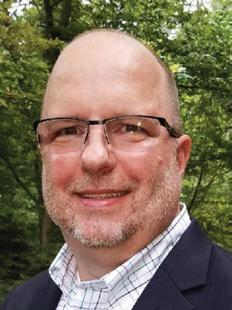
Retirement
Pastor Tom Cosat retired August 21 from Mullen Baptist Church in Montrose. He served 43 years in ministry, including 14 years at Mullen Baptist. The church celebrated him and his wife, Cheryl, with an open house on his last Sunday as pastor.
With the Lord
Monica Kim, wife of Pastor Andrew Kim, passed away September 23 after a long battle with cancer. She was honored with a homegoing service and funeral at Korean Baptist Church of Schuamburg, where Andrew Kim is pastor. Please be in prayer for Pastor Kim and the couple’s three children.

Build a better Sunday school
Marion | Sixty-five Sunday school directors and pastors from Illinois gathered at the southern end of the state in September for a National Sunday School Director Seminar at Second Baptist Church in Marion.
The training event, sponsored by LifeWay Christian Resources, aimed to equip church education leaders to better serve “students” in their Sunday school classes. IBSA’s Mark Emerson, who helped lead the seminar, said the group started by identifying the ultimate mission of Sunday school:
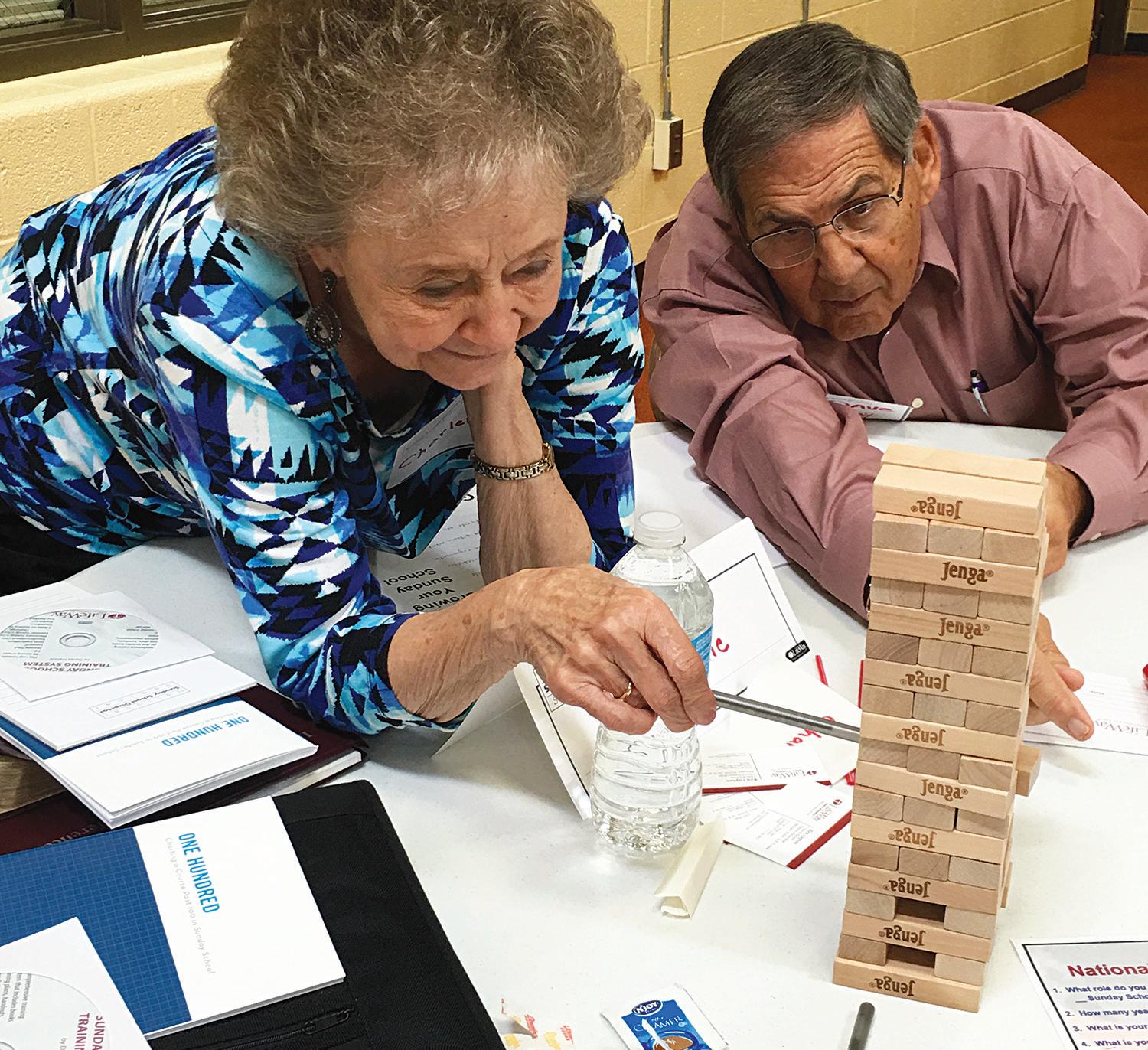
“The Sunday school is the foundational strategy for leading people to faith in the Lord Jesus Christ, and for building Great Commission Christians through open Bible study groups that invite people to discover truths of God’s Word and connect with others through fellowship and ministry.”
While that mission is a mouthful, Emerson admitted, the training in Marion also helped leaders break it down into smaller pieces. The second part of the conference dealt with the five basic tenants of Sunday school identified by expert Arthur Flake in the early 1900s: Know your possibilities
Enlarge the organization
Enlist and train workers
Provide space, equipment Go after the people.
An effective small groups strategy is key to church health and growth, Emerson said. “If you look at the most recent ACP data for our state, you will notice that the ‘normal’ size church for Illinois is attracting 65 people to their Sunday school (or other small group ministry), and 72 to worship.” With most congrega-
tions either plateaued or declining, he said, churches need an intentional plan to reach and disciple people. For more information about growing your church’s Sunday school or small groups ministry, go to IBSA. org/education or contact IBSA’s Church Resources Team at (217) 391-3124.
Youth group serves in ‘Music City’

The youth group from West Gate Baptist Church in Trenton spent a week in Nashville, Tenn., a city known for its country music and Southern hospitality, and also for its growing cultural and economic diversity.
The teens (left) worked on service projects at food banks and assisted living facilities. They prepped a community center for the new school year, and served in a factory that provides jobs for refugees.
Youth Pastor David Clay asked for prayer for Nashville and the churches serving there. “Pray that Christ will bring healing and restoration, and that he would draw to himself many from every ethnicity and background living in this great city.”
NeTworkiNg
Find more information on ministry positions at IBSA.org/connect
Send NetworkiNg items to IllinoisBaptist@IBSA.org
Streator Baptist Camp will host “The Streator Experience” October 17-19, a retreat for pastors which includes a preview of the 2017 January Bible Study materials. Michael Taylor, founder of Devoted to the Word Ministries, will serve as the retreat’s Bible teacher. Gospel trio Sons of the Father will lead in worship and will also give a concert, open to the public, on Tuesday at 7 p.m. For more information, contact Don Evans at pastordon63@gmail.com or Ric Worshill at chaplain@shomreem.org.
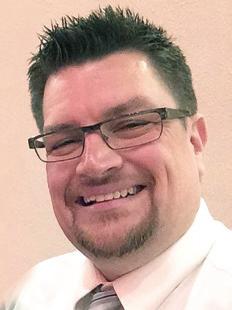
Charity Baptist Church, located about six miles outside Carlinville, seeks a pastor, either full-time or bivocational, who agrees with The Baptist Faith & Message (2000). Parsonage is available. Send resumé to Search Committee, 21694 Charity Church Road, Carlinville, IL 62626. Contact Bill Harding at (217) 854-6071.
Salem South Baptist Association is receiving resumes for director of missions. Send resumés to Salem South Baptist Association, 904 Park Avenue, P.O. Box 2458, Mt. Vernon, IL 62864, or e-mail salembaptist904 @charter.net. Please send to the attention of Don Evans.
EVENTS
October 9
Youth Encounter
What: IBSA’s premier student evangelism event

Where: Hillcrest, Chicagoland; Tabernacle, Decatur; Marion Civic Center
Cost: $25 per person, includes dinner Register: IBSA.org/Students
October 14-15
Disaster Relief Training
What: Classes in food prep, mudout, childcare, chaplaincy, and more
Where: Lake Sallateeska Baptist Camp
Cost: $30 new trainees, $10 renewals Register: IBSA.org/DR
October 15
Hispanic Women’s Conference
What: Worship and teaching, featuring Chicago journalist Milenka Pena
Where: Broadview Missionary Baptist
Cost: $30, includes lunch
Info: anademelendez@gmail.com
October 22
Kids’ Ministry Resource Conference
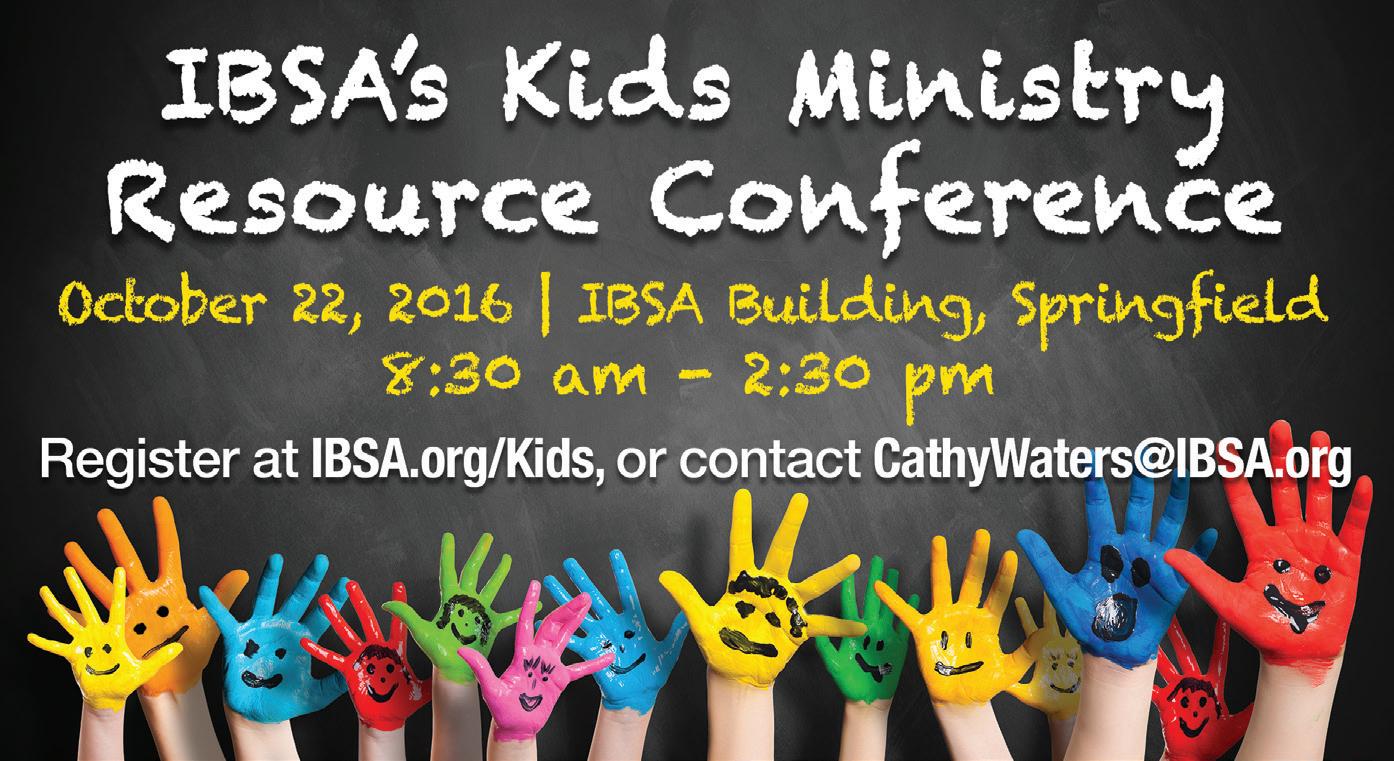
See ad this page
October 24-26
Worship Leaders’ Retreat
What: For full-time ministers of music and worship leaders
Where: Lake Sallateeska
Cost: $55 per person
Contact: DebbieMuller@IBSA.org
November 1-2
IBSA Pastors’ Conference
What: Preaching conference on “Crossroads: Our Pathway to Reconciliation”
Where: Broadview Missionary Baptist Church, suburban Chicago Information: (and list of speakers) IBSAannualmeeting.org
November 2-3
IBSA Annual Meeting
What: The 110th IBSA Annual Meeting will feature the annual sermon by Adron Robinson, pastor of Hillcrest Baptist Church, Country Club Hills.
Where: Broadview Missionary Baptist Church, suburban Chicago Information: IBSAannualmeeting.org
November 3
Pastors’ Wives Luncheon
What: Conference and luncheon for all ministers’ wives
Where: Broadview Missionary Baptist Church, suburban Chicago
Cost: $15 per person RSVP: givinglory@gmail.com, (618) 518-9346
November 4-5
AWSOM Conference
See ad this page
November 12
Ethnic Worship Leaders’ Workshop
What: Free workshop for worship leaders
Where: Uptown Baptist Church, Chicago Register: IBSA.org/Worship
DAVE RAMSEYdave says
Debt game plan
Financial family ties
QMy wife and I are debt-free except for a car and our house. The car is financed through her mom, and her dad agreed to send us half of the payment each month. We owe $7,700 on the car, and we have enough cash right now to pay off the car in full with plenty left over. Should we do this, even though her dad is making $100 of the payment each month?
AIf her father had agreed to send you guys $100 each month, ask him to continue doing that for the duration of the agreement. Then, you guys pay off the car now with your cash. There’s nothing dishonest about this, as long as you explain the plan to her parents and they’re agreeable.
The reason for this approach is two-fold: it gets the debt paid off, and then you can get the car put in your name. Plus, a situation like this represents drama just looking for a place to happen, if it hasn’t already. Family relationships take on a weird vibe when money has been loaned and borrowed.
If they’re not agreeable to the idea, that’s okay. All you can do is ask. But one way or another, I’d be out of this situation before the sun goes down!
Financial advisor Dave Ramsey is a prolific author and radio host.
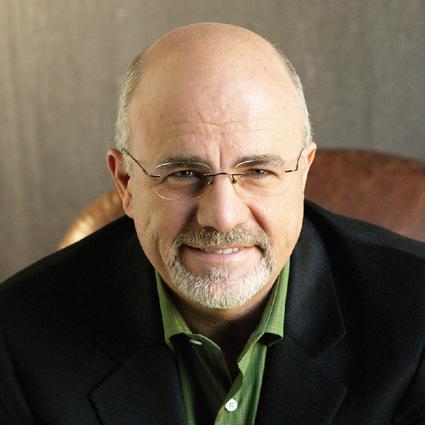
QMy husband and I own three commercial buildings in Boise, Idaho, that are leased out long-term. We owe about $500,000 on one and $400,000 on each of the others, and they earn $190,000. The only other debt we have is a small amount left on our mortgage. I know you don’t like debt, but is it okay to owe on commercial properties that are making good money?
AI believe the best plan for building wealth is to become debt-free. So, I can’t tell you that I think it’s okay to have debt on commercial buildings.
Now, from the situation you’ve described, that doesn’t necessarily mean you guys should be in panic mode and start selling everything in sight. But I do think that you should systematically work your way out from under these debts over the next few years.
If I were in your shoes, I’d go ahead and get the house paid off first. Then, I’d take a look at these commercial properties, and begin working the debt snowball on them. Start throwing as much money as you can at the smallest debt, while making minimum payments on the other two. When you get it paid off, roll that amount over— along with every dime you can dig up—and attack the second largest one. Follow these steps until you pay off all of your commercial properties.
It might take up to 10 years in your case, because we’re talking about at least $1.3 million in debt. If you have a bunch of equity in one you don’t particularly like, you might consider selling it and throwing the cash at the remaining two. But whatever the timeline, I’d develop a hardcore game plan to get rid of this debt.
i lead
New role, same plan
For many years, I was comfortable in my work and felt confident in my leadership abilities. I had a successful financial planning firm and was serving in a leadership role at our small-town church.
Church needed here...
Location: Mascoutah, St. Clair County
Focus: Unchurched families

Characteristics: A town of almost 8,000 people, Mascoutah is located near Scott Air Force Base, which is a major employer for people in the community. There is a strong IBSA church in Mascoutah, but the region needs more evangelical voices.

Prayer needs: Pray God will open a way for a church planter to build a new church to reach the unchurched in this community.
MIKE YOUNGThen, God called my family and me to serve as career missionaries with the International Mission Board. Ten years ago, after a lot of preparation, which included selling my business and home, we moved to Czech Republic. Leading, once again, became a significant part of my life as I began to lead nationals, colleagues, and shortterm mission teams.
While adapting to a different culture and learning a second language, I also had to develop an effective way to lead in a new context that was often outside of my comfort zone. I had to ask myself, “How do I become an effective leader in these new and unfamiliar circumstances?”
Although people and cultures are different, one thing we all have in common is the fact that God gives each of us unique gifts, talents, skills, and abilities. I learned that an important part of leading effectively, in any context, is getting to know each person individually.
After finding out what their God-given abilities are, each person can be led to the job/ministry where they can be most fulfilled and effective. 1 Corinthians 12:4-6 says, “Now there are varieties of gifts, but the same Spirit; and there are varieties of service, but the same Lord; and there are varieties of activities, but it is the same God who empowers them all in everyone.”
Last year, my family and I moved back to the United States. God called me to a new job and ministry that allows me to use my gifts and talents, including leadership. In March of this year, I started working as the director of Streator Baptist Camp.
Once again, I am learning to live in a different culture as I readapt to the ever-changing American lifestyle. I am looking at how to lead effectively in yet another new context. By implementing the same leadership strategy I have used in the past, I am leading employees, campers, and volunteer teams to work and serve the Lord.
Even when facing unfamiliar circumstances, effective leaders know the people they’re leading, and guide them to use their own gifts, talents, skills, and abilities.
Mike Young manages Streator Baptist Camp for the Illinois Baptist State Association.
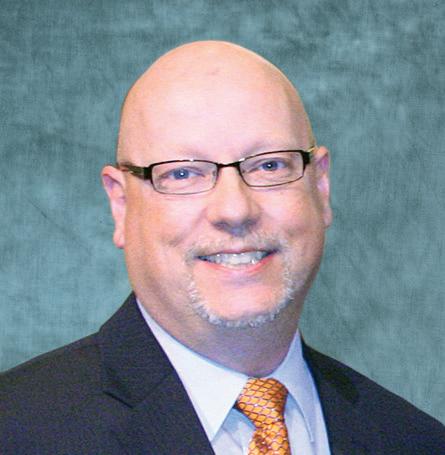

pinterest.com/illinoisBaptist

Pastoral Care Week
Cleansing power
“But if we walk in the light as He Himself is in the light, we have fellowship with one another, and the blood of Jesus His Son cleanses us from all sin”
(1 John 1:7, ESV)
“It’s too late for me.”
“If you knew all the bad things I’ve done, you would see that God couldn’t possibly forgive me.”
I have had this very conversation with adults who have never given their lives to Jesus. Somehow they believe that God is incapable of—or unwilling to—forgive their sins.
You know that October is Pastor Appreciation Month, but there’s also a week set aside especially to recognize the role of pastoral care and counseling. October 16-22 is dedicated to “spiritual resilience.” In addition to honoring pastors, chaplains, counselors, and others who provide pastoral care, this week is a good time to focus on those who need spiritual care. Organizers of the event encourage initiating discussions with people who have suffered loss or who have experienced trauma that they can’t seem to overcome.
– Pastoralcareweek.org
While John is specifically writing to believers in the early church, the truth of the cleansing power of the blood of Jesus applies to sinners.
Jesus possesses the authority to forgive sins. He is the only one who can do it.
It’s not the number of sins we commit. It’s not really the kind of sins we commit. It’s not the frequency of sins we commit. It’s whether or not we confess our sins to Jesus that matters. It is spiritually unhealthy for sin to remain unconfessed in our lives. If we want to walk in sweet fellowship with one another, then let’s bring our sin to the Light of the World to dispel the darkness of sin. Jesus is ready to cleanse us and give us the peace that passes all understanding.
KEVIN CARROTHERSPRAYER PROMPT: O Lord, forgive a sinner such as I am.

Kevin Carrothers serves as pastor of Rochester FBC and president of IBSA.
Pastors, join the IBSA Pastors’ Prayer Room on Facebook. E-mail oweaver7307@ gmail.com.
